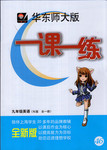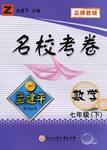题目内容
阅读理解
Heat(热量) comes from many things. Heat comes from the sun. Heat comes from gas(气体). Heat comes from oil( 油). When wood burn,t makes heat, too.
We use heat in many ways. We use it to cook. We use it to keep warm. We use it to dry(使干) things.
Your body (身体) makes heat. Put your hand on your head. Does it feel hot? Your body is like a stove(炉). It does not burn wood. It burns food. Food helps you keep warm.
根据短文判断正误
1.Heat is important to us.
2. We can get heat from many things.
3. We burn wood to get heat.
4.We bum our bodies to make heat.
5. We use heat only to keep ourselves warm.
1.T
2.T
3.T
4.F
5.F
【解析】
1.考查对短文的理解,根据短文第二段可知热量对我们很重要可知是正确的
2.根据短文第一段第一句可知
3.根据短文第一段第五句可知,我们可通过燃烧木头获得热量
4.该句短文中没提及,故该句是错误的
5.我们用热量不仅仅是为了保暖,因此是错误的

 华东师大版一课一练系列答案
华东师大版一课一练系列答案 孟建平名校考卷系列答案
孟建平名校考卷系列答案
| |||||||||||||||||||||||||||||||||
阅读理解
We spent a few days in Paris last week. We visit the famous city quite regularly. After all, it only takes three hours from London to Pairs. It’s always a pleasure visiting places we really like, exploring areas we’ve never been.
The only unlucky thing this time was the weather. As soon as we got there the temperature reached almost 35 degrees C (which lasted until we left). It was so hot that Matthew just couldn’t stand it — for him, it wasn’t the most enjoyable trip. I felt sorry for him because every time we go there he has to put up with (忍受) my endless shopping spree (狂欢) …
Because of the heat, we ended up just having lots of ice-cream and drinks most of the time, although we managed to pay a few visits to the new Herme shop on rue de Vaugirard at least. It’s not as busy as the shop on rue Bonaparte so you can choose whatever you like without worrying about a queue behind you! I really enjoyed his bread this time as well as the cakes. And I must say that his Croissant aux Amandes and Bostock were simply the best I’ve ever had.
1.Which of the following is TRUE according to the first paragraph?
|
A.It was the first time for the writer to go to Paris. |
|
B.It was a long way from London to Paris. |
|
C.The writer lives in London. |
|
D.The writer only likes to go to places she has never been to. |
2. The underlined word “stand” in the second paragraph means ____.
|
A.享受 |
B.忍受 |
C.站立 |
D.位于 |
3. What can you know about Matthew from the second paragraph?
|
A.He doesn’t like shopping. |
B.He doesn’t like travelling. |
|
C.He is one of the writer’s relatives. |
D.He isn’t a good husband. |
4. The shops on rue Bonaparte ____.
|
A.has no bread that the writer likes |
B.is often crowded with customers |
|
C.don’t have anything the writer likes |
D.is not very busy all the time |
5.What’s the best title for the passage?
|
A.An unpleasant trip |
B.A great city |
|
C.A shopping centre |
D.A trip to Paris |
